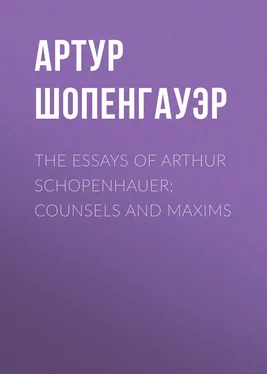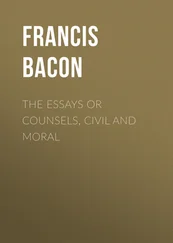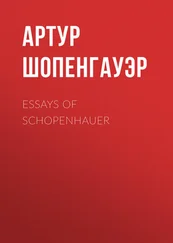Артур Шопенгауэр - The Essays of Arthur Schopenhauer; Counsels and Maxims
Здесь есть возможность читать онлайн «Артур Шопенгауэр - The Essays of Arthur Schopenhauer; Counsels and Maxims» — ознакомительный отрывок электронной книги совершенно бесплатно, а после прочтения отрывка купить полную версию. В некоторых случаях можно слушать аудио, скачать через торрент в формате fb2 и присутствует краткое содержание. Жанр: Философия, literature_19, foreign_antique, foreign_prose, на английском языке. Описание произведения, (предисловие) а так же отзывы посетителей доступны на портале библиотеки ЛибКат.
- Название:The Essays of Arthur Schopenhauer; Counsels and Maxims
- Автор:
- Жанр:
- Год:неизвестен
- ISBN:нет данных
- Рейтинг книги:3 / 5. Голосов: 1
-
Избранное:Добавить в избранное
- Отзывы:
-
Ваша оценка:
- 60
- 1
- 2
- 3
- 4
- 5
The Essays of Arthur Schopenhauer; Counsels and Maxims: краткое содержание, описание и аннотация
Предлагаем к чтению аннотацию, описание, краткое содержание или предисловие (зависит от того, что написал сам автор книги «The Essays of Arthur Schopenhauer; Counsels and Maxims»). Если вы не нашли необходимую информацию о книге — напишите в комментариях, мы постараемся отыскать её.
The Essays of Arthur Schopenhauer; Counsels and Maxims — читать онлайн ознакомительный отрывок
Ниже представлен текст книги, разбитый по страницам. Система сохранения места последней прочитанной страницы, позволяет с удобством читать онлайн бесплатно книгу «The Essays of Arthur Schopenhauer; Counsels and Maxims», без необходимости каждый раз заново искать на чём Вы остановились. Поставьте закладку, и сможете в любой момент перейти на страницу, на которой закончили чтение.
Интервал:
Закладка:
With mourning it is just the same. That long funeral procession, moving up so slowly; how melancholy it looks! what an endless row of carriages! But look into them – they are all empty; the coachmen of the whole town are the sole escort the dead man has to his grave. Eloquent picture of the friendship and esteem of the world! This is the falsehood, the hollowness, the hypocrisy of human affairs!
Take another example – a roomful of guests in full dress, being received with great ceremony. You could almost believe that this is a noble and distinguished company; but, as a matter of fact, it is compulsion, pain and boredom who are the real guests. For where many are invited, it is a rabble – even if they all wear stars. Really good society is everywhere of necessity very small. In brilliant festivals and noisy entertainments, there is always, at bottom, a sense of emptiness prevalent. A false tone is there: such gatherings are in strange contrast with the misery and barrenness of our existence. The contrast brings the true condition into greater relief. Still, these gatherings are effective from the outside; and that is just their purpose. Chamfort 9 9 Translator's Note . Nicholas "Chamfort" (1741-94), a French miscellaneous writer, whose brilliant conversation, power of sarcasm, and epigrammic force, coupled with an extraordinary career, render him one of the most interesting and remarkable men of his time. Schopenhauer undoubtedly owed much to this writer, to whom he constantly refers.
makes the excellent remark that society — les cercles, les salons, ce qu'on appelle le monde – is like a miserable play, or a bad opera, without any interest in itself, but supported for a time by mechanical aid, costumes and scenery.
And so, too, with academies and chairs of philosophy. You have a kind of sign-board hung out to show the apparent abode of wisdom : but wisdom is another guest who declines the invitation; she is to be found elsewhere. The chiming of bells, ecclesiastical millinery, attitudes of devotion, insane antics – these are the pretence, the false show of piety . And so on. Everything in the world is like a hollow nut; there is little kernel anywhere, and when it does exist, it is still more rare to find it in the shell. You may look for it elsewhere, and find it, as a rule, only by chance.
SECTION 2. To estimate a man's condition in regard to happiness, it is necessary to ask, not what things please him, but what things trouble him; and the more trivial these things are in themselves, the happier the man will be. To be irritated by trifles, a man must be well off; for in misfortunes trifles are unfelt.
SECTION 3. Care should be taken not to build the happiness of life upon a broad foundation – not to require a great many things in order to be happy. For happiness on such a foundation is the most easily undermined; it offers many more opportunities for accidents; and accidents are always happening. The architecture of happiness follows a plan in this respect just the opposite of that adopted in every other case, where the broadest foundation offers the greatest security. Accordingly, to reduce your claims to the lowest possible degree, in comparison with your means, – of whatever kind these may be – is the surest way of avoiding extreme misfortune.
To make extensive preparations for life – no matter what form they may take – is one of the greatest and commonest of follies. Such preparations presuppose, in the first place, a long life, the full and complete term of years appointed to man – and how few reach it! and even if it be reached, it is still too short for all the plans that have been made; for to carry them out requites more time than was thought necessary at the beginning. And then how many mischances and obstacles stand in the way! how seldom the goal is ever reached in human affairs!
And lastly, even though the goal should be reached, the changes which Time works in us have been left out of the reckoning: we forget that the capacity whether for achievement or for enjoyment does not last a whole lifetime. So we often toil for things which are no longer suited to us when we attain them; and again, the years we spend in preparing for some work, unconsciously rob us of the power for carrying it out.
How often it happens that a man is unable to enjoy the wealth which he acquired at so much trouble and risk, and that the fruits of his labor are reserved for others; or that he is incapable of filling the position which he has won after so many years of toil and struggle. Fortune has come too late for him; or, contrarily, he has come too late for fortune, – when, for instance, he wants to achieve great things, say, in art or literature: the popular taste has changed, it may be; a new generation has grown up, which takes no interest in his work; others have gone a shorter way and got the start of him. These are the facts of life which Horace must have had in view, when he lamented the uselessness of all advice: —
10 10 Odes II. xi.
The cause of this commonest of all follies is that optical illusion of the mind from which everyone suffers, making life, at its beginning, seem of long duration; and at its end, when one looks back over the course of it, how short a time it seems! There is some advantage in the illusion; but for it, no great work would ever be done.
Our life is like a journey on which, as we advance, the landscape takes a different view from that which it presented at first, and changes again, as we come nearer. This is just what happens – especially with our wishes. We often find something else, nay, something better than what we are looking for; and what we look for, we often find on a very different path from that on which we began a vain search. Instead of finding, as we expected, pleasure, happiness, joy, we get experience, insight, knowledge – a real and permanent blessing, instead of a fleeting and illusory one.
This is the thought that runs through Wilkelm Meister , like the bass in a piece of music. In this work of Goethe's, we have a novel of the intellectual kind, and, therefore, superior to all others, even to Sir Walter Scott's, which are, one and all, ethical ; in other words, they treat of human nature only from the side of the will. So, too, in the Zauberflöte – that grotesque, but still significant, and even hieroglyphic – the same thought is symbolized, but in great, coarse lines, much in the way in which scenery is painted. Here the symbol would be complete if Tamino were in the end to be cured of his desire to possess Tainina, and received, in her stead, initiation into the mysteries of the Temple of Wisdom. It is quite right for Papageno, his necessary contrast, to succeed in getting his Papagena.
Men of any worth or value soon come to see that they are in the hands of Fate, and gratefully submit to be moulded by its teachings. They recognize that the fruit of life is experience, and not happiness; they become accustomed and content to exchange hope for insight; and, in the end, they can say, with Petrarch, that all they care for is to learn: —
Altro diletto che 'mparar, non provo .
It may even be that they to some extent still follow their old wishes and aims, trifling with them, as it were, for the sake of appearances; all the while really and seriously looking for nothing but instruction; a process which lends them an air of genius, a trait of something contemplative and sublime.
In their search for gold, the alchemists discovered other things – gunpowder, china, medicines, the laws of nature. There is a sense in which we are all alchemists.
Читать дальшеИнтервал:
Закладка:
Похожие книги на «The Essays of Arthur Schopenhauer; Counsels and Maxims»
Представляем Вашему вниманию похожие книги на «The Essays of Arthur Schopenhauer; Counsels and Maxims» списком для выбора. Мы отобрали схожую по названию и смыслу литературу в надежде предоставить читателям больше вариантов отыскать новые, интересные, ещё непрочитанные произведения.
Обсуждение, отзывы о книге «The Essays of Arthur Schopenhauer; Counsels and Maxims» и просто собственные мнения читателей. Оставьте ваши комментарии, напишите, что Вы думаете о произведении, его смысле или главных героях. Укажите что конкретно понравилось, а что нет, и почему Вы так считаете.












